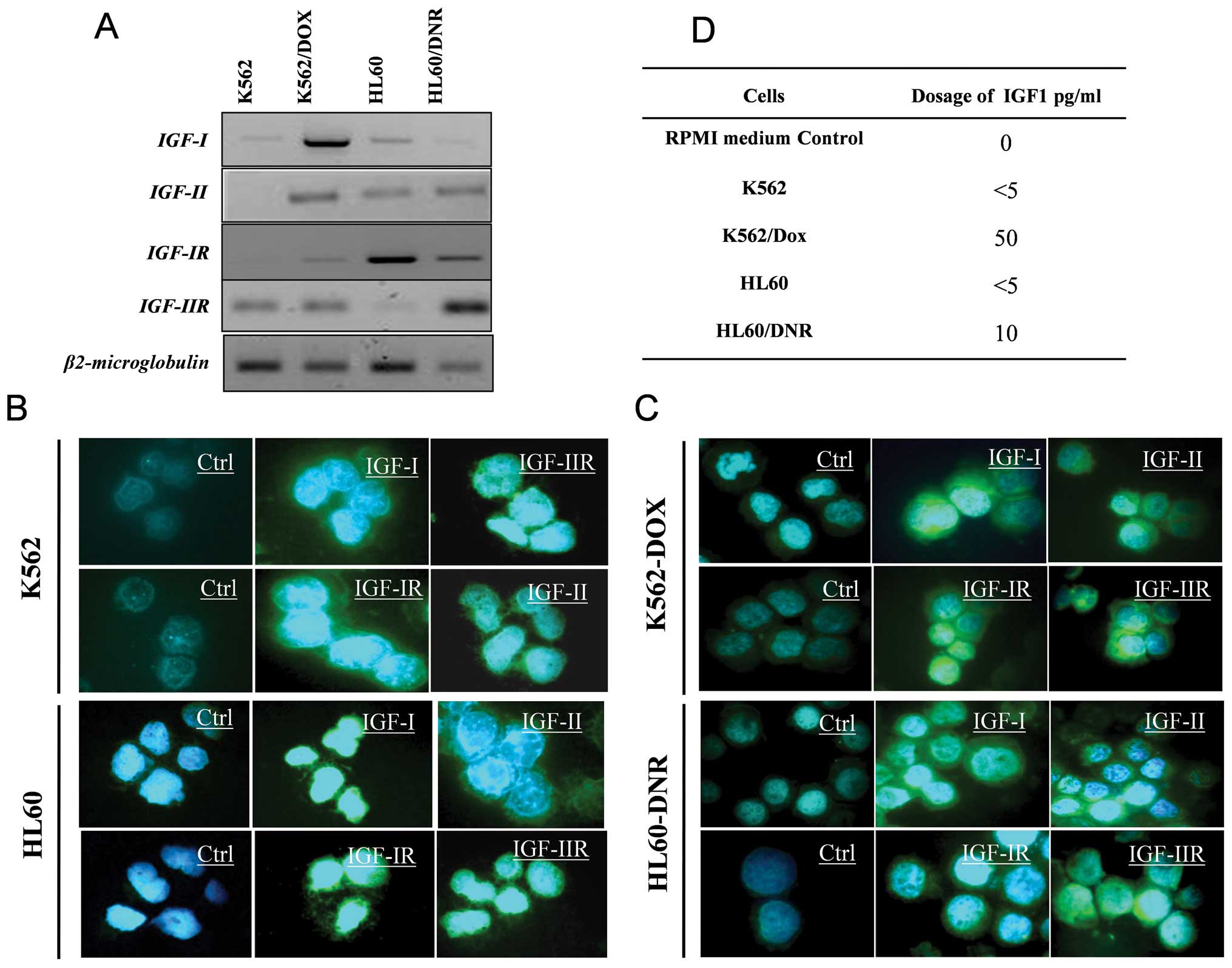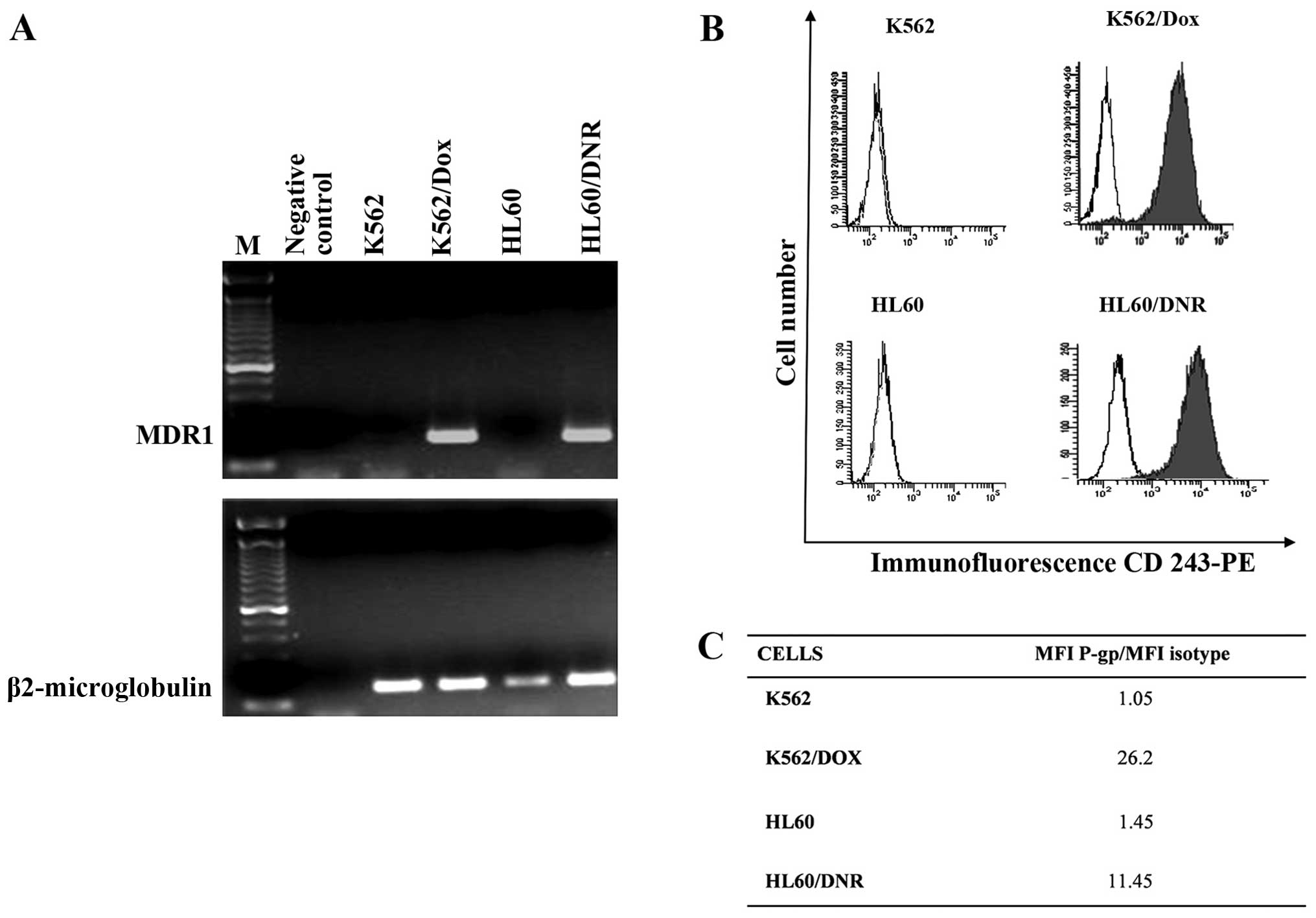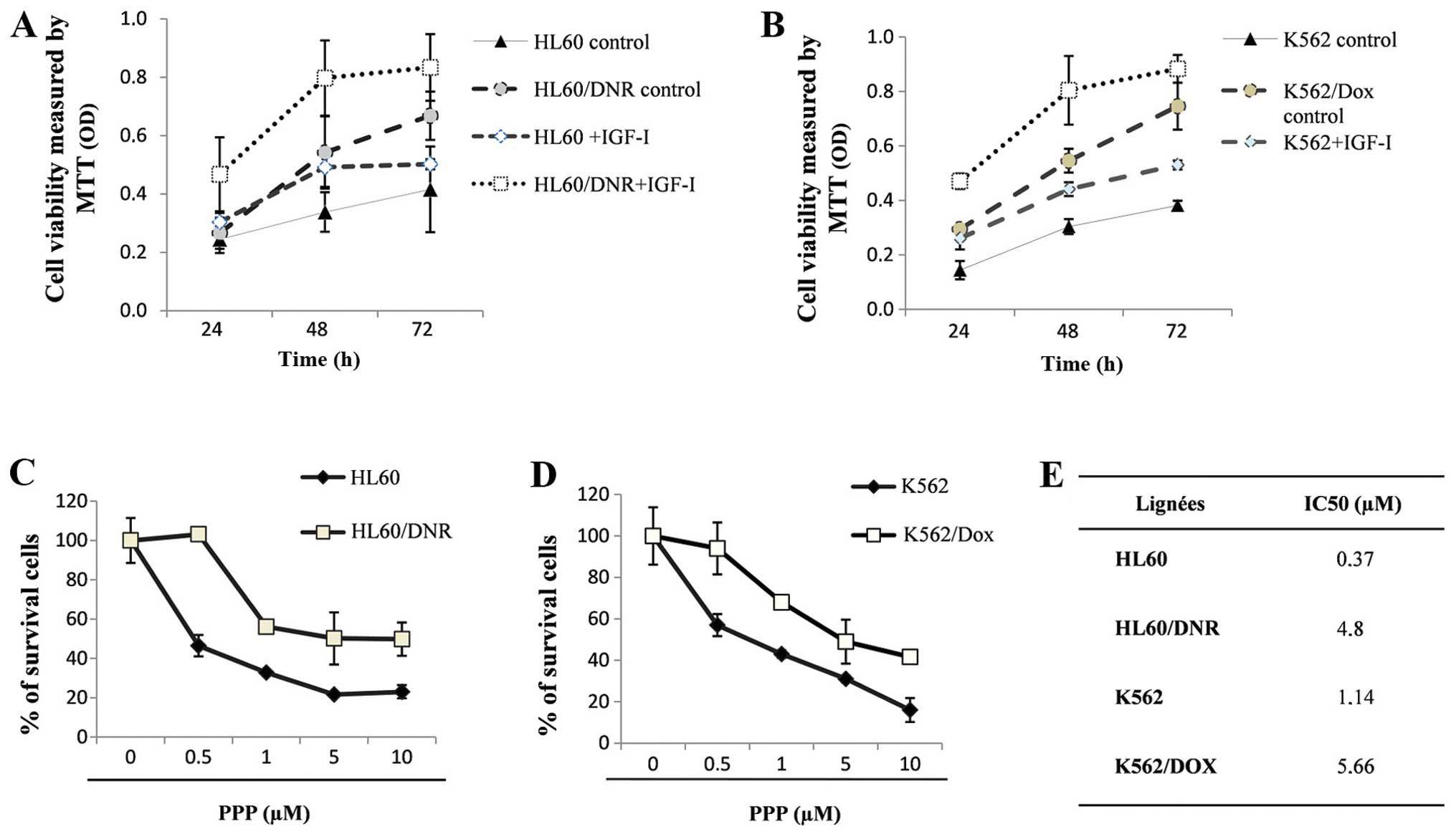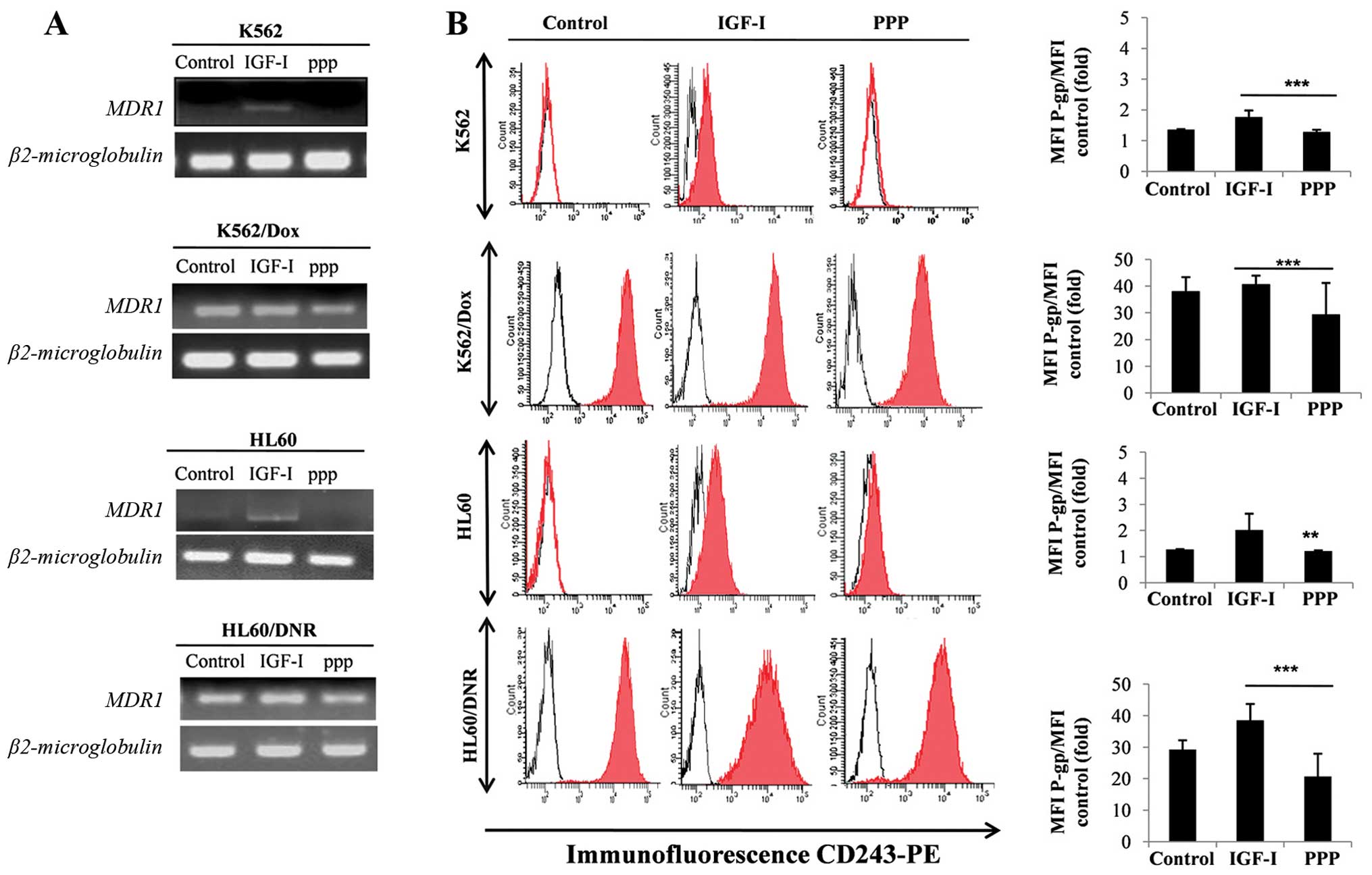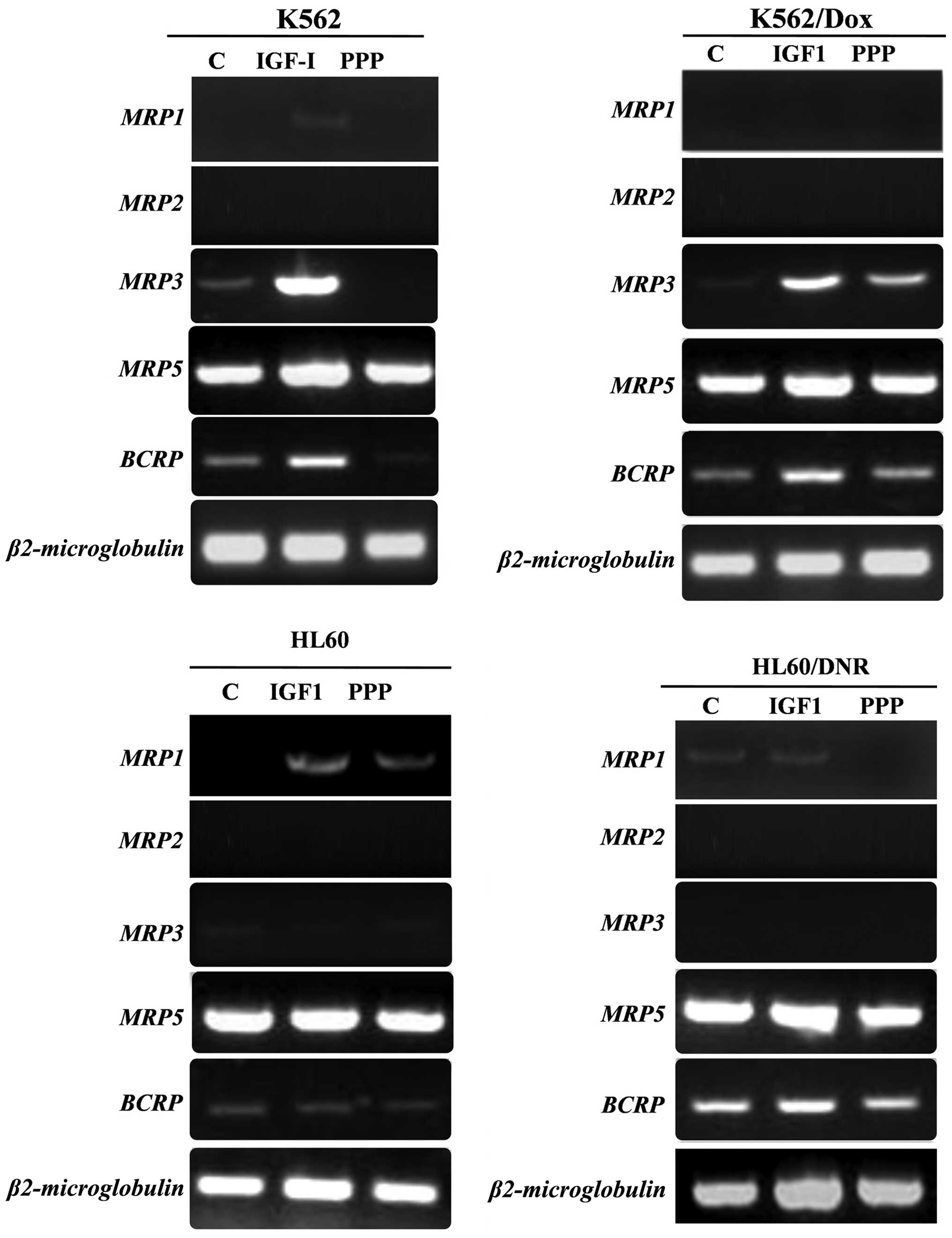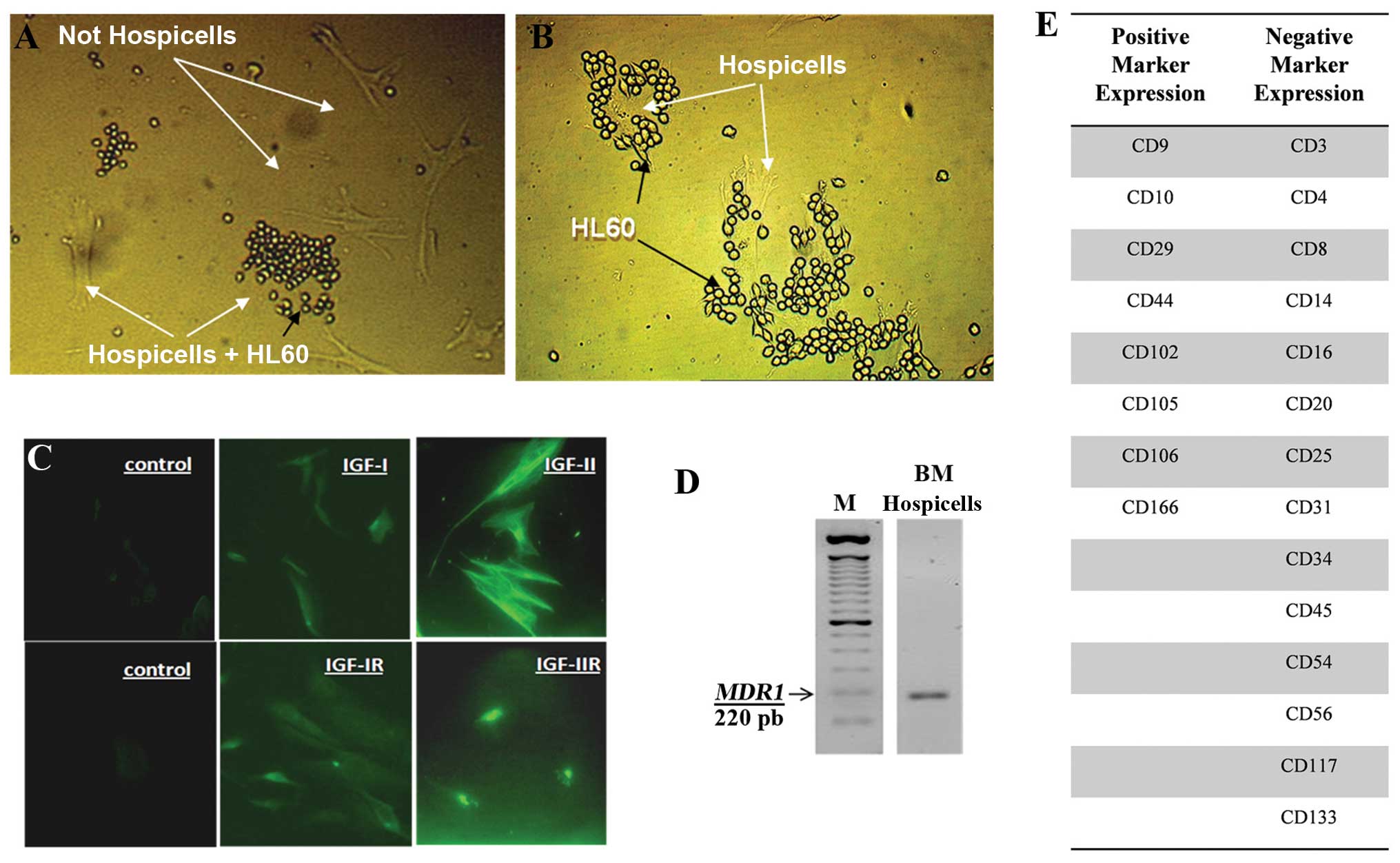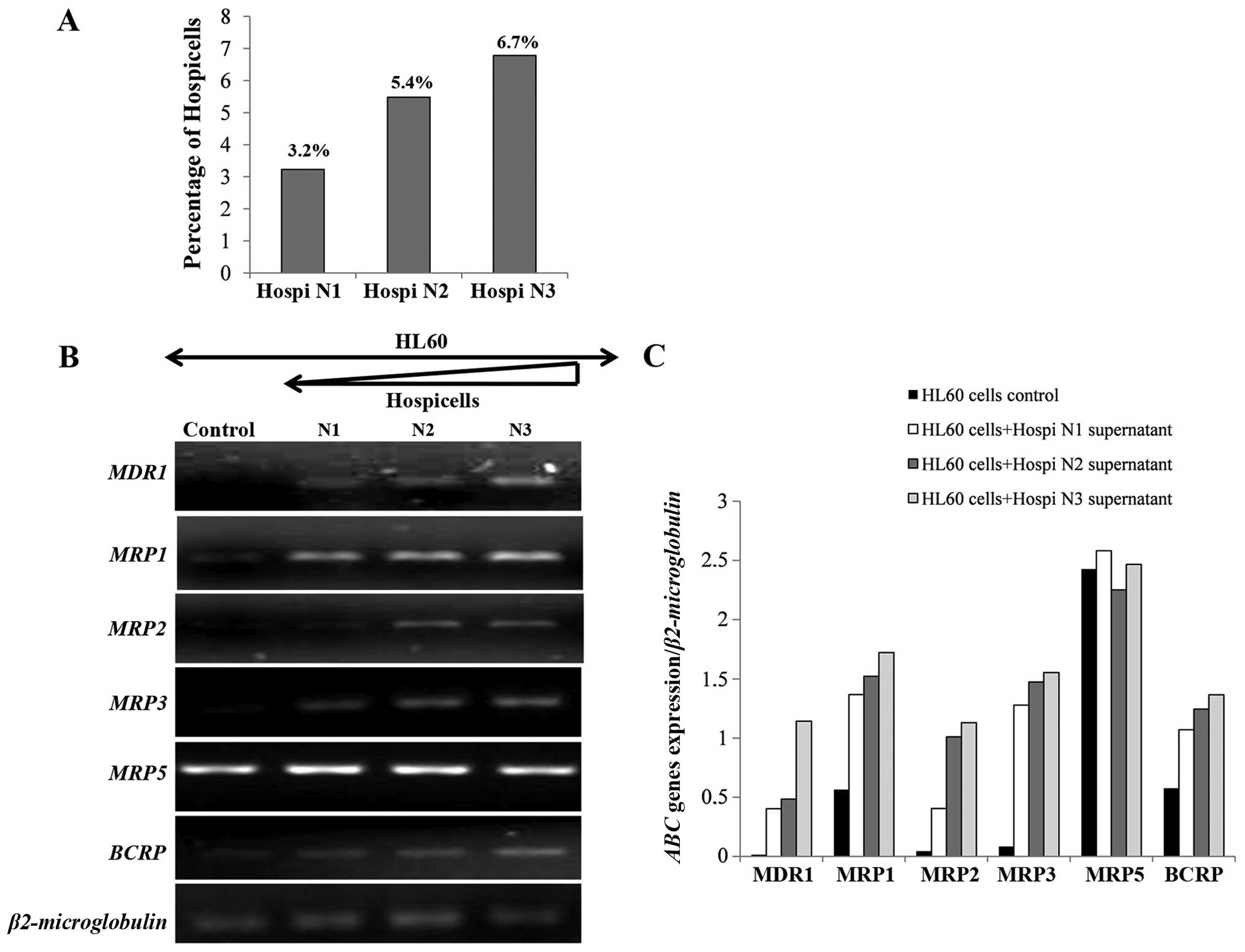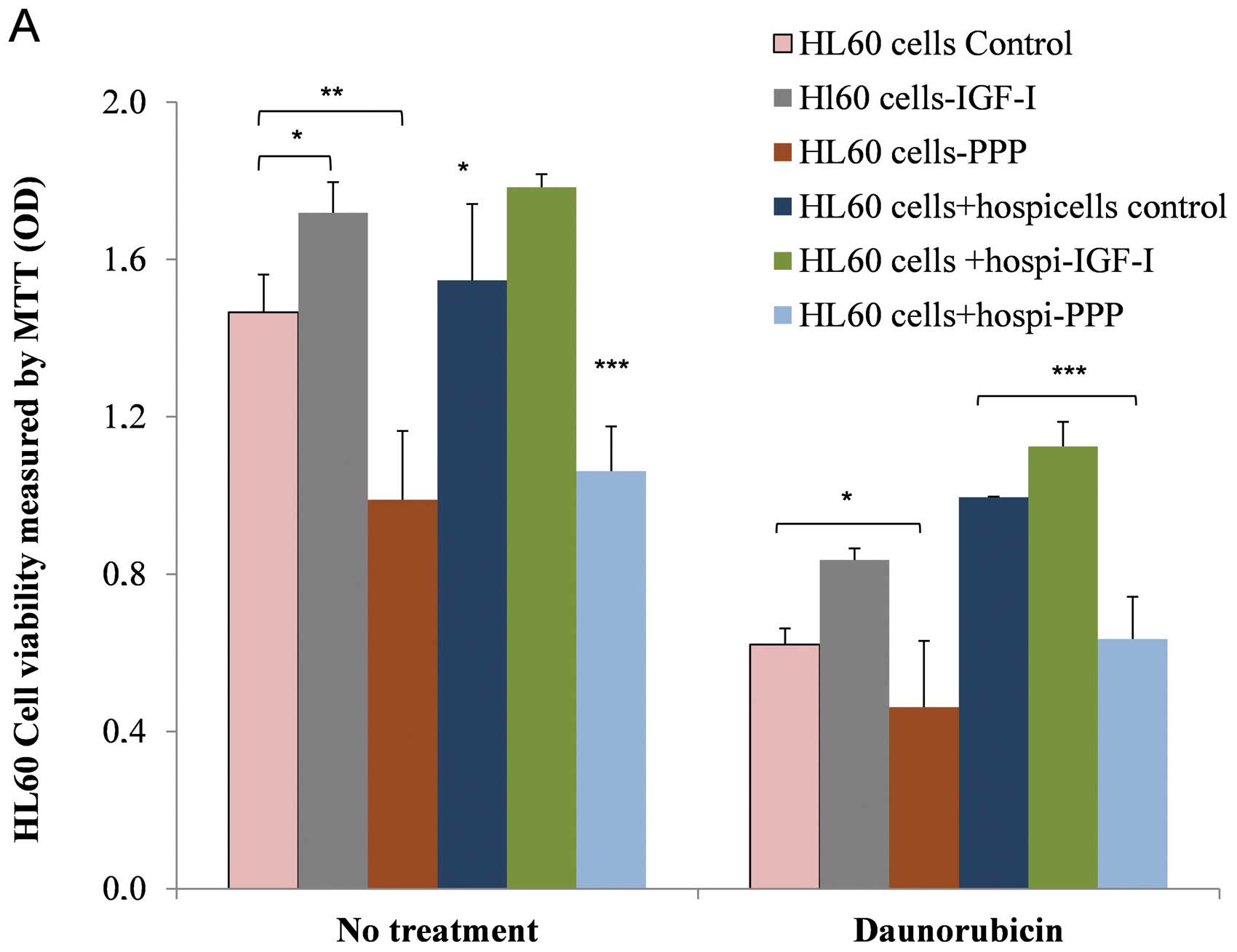|
1
|
Baudard M, Beauchamp-Nicoud A, Delmer A,
Rio B, Blanc C, Zittoun R and Marie JP: Has the prognosis of adult
patients with acute myeloid leukemia improved over years? A single
institution experience of 784 consecutive patients over a 16-year
period. Leukemia. 13:1481–1489. 1999.
|
|
2
|
Rafii A, Mirshahi P, Poupot M, Faussat AM,
Simon A, Ducros E, Mery E, Couderc B, Lis R, Capdet J, Bergalet J,
Querleu D, Dagonnet F, Fournié JJ, Marie JP, Pujade-Lauraine E,
Favre G, Soria J and Mirshahi M: Oncologic trogocytosis of an
original stromal cells induces chemoresistance of ovarian tumours.
PLoS One. 3:e38942008. View Article : Google Scholar : PubMed/NCBI
|
|
3
|
Lis R, Capdet J, Mirshahi P, Lacroix-Triki
M, Dagonnet F, Klein C, Mirshahi M, Fournié JJ, Rafii A and Poupot
M: Oncologic trogocytosis with Hospicells induces the expression of
N-cadherin by breast cancer cells. Int J Oncol. 37:1453–1461.
2010.PubMed/NCBI
|
|
4
|
Benabbou N, Mirshahi P, Cadillon M, Soria
J, Therwath A and Mirshahi M: Hospicells promote upregulation of
the ATP binding cassette genes by insulin like growth factor-I via
JAK2- STAT3 signaling pathway in ovarian cancer cell line. Int J
Oncol. 43:685–694. 2013.PubMed/NCBI
|
|
5
|
Pasquet M, Golzio M, Mery E, Rafii A,
Benabbou N, Mirshahi P, Hennebelle I, Bourin P, Allal B, Teissie J,
Mirshahi M and Couderc B: Hospicells (ascites-derived stromal
cells) promote tumorigenicity and angiogenesis. Int J Cancer.
126:2090–2101. 2010.PubMed/NCBI
|
|
6
|
Martinet L, Poupot R, Mirshahi P, Rafii A,
Fournié JJ, Mirshahi M and Poupot M: Hospicells derived from
ovarian cancer stroma inhibit T-cell immune responses. Int J
Cancer. 126:2143–2152. 2010.PubMed/NCBI
|
|
7
|
Castells M, Thibault B, Mery E, Golzio M,
Pasquet M, Hennebelle I, Bourin P, Mirshahi M, Delord JP, Querleu D
and Couderc B: Ovarian ascites-derived Hospicells promote
angiogenesis via activation of macrophages. Cancer Lett. 326:59–68.
2012. View Article : Google Scholar : PubMed/NCBI
|
|
8
|
Mirshahi P, Rafii A, Vincent L, Berthaut
A, Varin R, Kalantar G, Marzac C, Calandini OA, Marie JP, Soria C,
Soria J and Mirshahi M: Vasculogenic mimicry of acute leukemic bone
marrow stromal cells. Leukemia. 23:1039–1048. 2009. View Article : Google Scholar : PubMed/NCBI
|
|
9
|
Wu X, Tortolero-Luna G, Zhao H, Phatak D,
Spitz MR and Follen M: Serum levels of insulin-like growth factor I
and risk of squamous intraepithelial lesions of the cervix. Clin
Cancer Res. 9:3356–3361. 2003.PubMed/NCBI
|
|
10
|
Yang SY and Winslet M: The IGF system in
carcinogenesis and its implication for cancer therapy. Curr Oncol.
18:301–302. 2011.PubMed/NCBI
|
|
11
|
Samani AA, Yakar S, Le Roith D and Brodt
P: The role ofhe IGF system in cancer growth and metastasis:
overview and recent insights. Endocr Rev. 28:20–47. 2007.
View Article : Google Scholar : PubMed/NCBI
|
|
12
|
Héron-Milhavet L and LeRoith D:
Insulin-like growth factor I induces MDM2-dependent degradation of
p53 via the p38 MAPK pathway in response to DNA damage. J Biol
Chem. 277:15600–15606. 2002.PubMed/NCBI
|
|
13
|
He Y, Zhang J, Zheng J, Du W, Xiao H, Liu
W, Li X, Chen X, Yang L and Huang S: The insulin-like growth
factor-1 receptor kinase inhibitor, NVP-ADW742, suppresses survival
and resistance to chemotherapy in acute myeloid leukemia cells.
Oncol Res. 19:35–43. 2010. View Article : Google Scholar : PubMed/NCBI
|
|
14
|
Abe S, Funato T, Takahashi S, Yokoyama H,
Yamamoto J, Tomiya Y, Yamada-Fujiwara M, Ishizawa K, Kameoka J,
Kaku M, Harigae H and Sasaki T: Increased expression of
insulin-like growth factor 1 is associated with Ara-C resistance in
leukemia. Tohoku J Exp Med. 209:217–228. 2006. View Article : Google Scholar : PubMed/NCBI
|
|
15
|
Kuhn DJ, Berkova Z, Jones RJ, Woessner R,
Bjorklund CC, Ma W, Davis RE, Lin P, Wang H, Madden TL, Wei C,
Baladandayuthapani V, et al: Targeting the insulin-like growth
factor-1 receptor to overcome bortezomib resistance in preclinical
models of multiple myeloma. Blood. 120:3260–3270. 2012. View Article : Google Scholar : PubMed/NCBI
|
|
16
|
Guo YS, Jin GF, Houston CW, Thompson JC
and Townsend CM Jr: Insulin-like growth factor-I promotes multidrug
resistance in MCLM colon cancer cells. J Cell Physiol. 175:141–148.
1998. View Article : Google Scholar : PubMed/NCBI
|
|
17
|
Schwarze CP, Neu S, Beck J, Mavridou K,
Ranke MB and Binder G: Influence of IGF-I and cell density on MDR1
expression in the T-lymphoblastoid cell line CCRF-CEM. Horm Res.
52:192–199. 1999. View Article : Google Scholar : PubMed/NCBI
|
|
18
|
Shimon I and Shpilberg O: The insulin-like
growth factor system in regulation of normal and malignant
hematopoiesis. Leuk Res. 19:233–240. 1995. View Article : Google Scholar : PubMed/NCBI
|
|
19
|
Doepfner KT, Spertini O and Arcaro A:
Autocrine insulin-like growth factor-I signaling promotes growth
and survival of human acute myeloid leukemia cells via the
phosphoinositide 3-kinase/Akt pathway. Leukemia. 21:1921–1930.
2007. View Article : Google Scholar : PubMed/NCBI
|
|
20
|
Baier TG, Jenne EW, Blum W, Schönberg D
and Hartmann KK: Influence of antibodies against IGF-I, insulin or
their receptors on proliferation of human acute lymphoblastic
leukemia cell lines. Leuk Res. 16:807–814. 1992. View Article : Google Scholar : PubMed/NCBI
|
|
21
|
Gilmore MJ, Prentice HG, Blacklock HA,
Janossy G and Hoffbrand AV: A technique for rapid isolation of bone
marrow mononuclear cells using Ficoll-Metrizoate and the IBM 2991
blood cell processor. Br J Haematol. 50:619–626. 1982. View Article : Google Scholar : PubMed/NCBI
|
|
22
|
Girnita A, Girnita L, del Prete F,
Bartolazzi A, Larsson O and Axelson M: Cyclolignans as inhibitors
of the insulin-like growth factor-1 receptor and malignant cell
growth. Cancer Res. 64:236–242. 2004. View Article : Google Scholar : PubMed/NCBI
|
|
23
|
Qiang YW, Kopantzev E and Rudikoff S:
Insulin like growth factor-I signaling in multiple myeloma:
downstream elements, functional correlates, and pathway cross-talk.
Blood. 99:4138–4146. 2002. View Article : Google Scholar : PubMed/NCBI
|
|
24
|
Rodon J, DeSantos V, Ferry RJ Jr and
Kurzrock R: Early drug development of inhibitors of the
insulin-like growth factor-I receptor pathway: lessons from the
first clinical trials. Mol Cancer Ther. 7:2575–2588. 2008.
View Article : Google Scholar : PubMed/NCBI
|
|
25
|
Gregory CW, DeGeorges A and Sikes RA: The
IGF axis in the development and progression of prostate cancer.
Recent Res Dev Cancer. 3:437–462. 2001.
|
|
26
|
Macaulay VM: Insulin-like growth factors
and cancer. Br J Cancer. 65:311–320. 1992. View Article : Google Scholar : PubMed/NCBI
|
|
27
|
Burren CP, Berka JL, Edmondson SR, Werther
GA and Batch JA: Localization of mRNAs for insulin-like growth
factor-I (IGF-I), IGF-I receptor, and IGF binding proteins in rat
eye. Invest Ophthalmol Vis Sci. 37:1459–1468. 1996.PubMed/NCBI
|
|
28
|
Clemmons DR and Maile LA: Integral
membrane proteins that function coordinately with the insulin-like
growth factor I receptor to regulate intracellular signaling.
Endocrinology. 144:1664–1670. 2003. View Article : Google Scholar
|
|
29
|
Turner HE, Harris AL, Melmed S and Wass
JA: Angiogenesis in endocrine tumors. Endocr Rev. 24:600–632. 2003.
View Article : Google Scholar : PubMed/NCBI
|
|
30
|
Wu KD, Zhou L, Burtrum D, Ludwig DL and
Moore MA: Antibody targeting of the insulin like growth factor I
receptor enhances the anti-tumor response of multiple myeloma to
chemotherapy through inhibition of tumor proliferation and
angiogenesis. Cancer Immunol Immunother. 56:343–357. 2007.
|
|
31
|
Karamouzis MV and Papavassiliou AG:
Targeting insulin-like growth factor in breast cancer therapeutics.
Crit Rev Oncol Hematol. 84:8–17. 2012. View Article : Google Scholar : PubMed/NCBI
|
|
32
|
Hopkins A, Crowe PJ and Yang JL: Effect of
type 1 insulin-like growth factor receptor targeted therapy on
chemotherapy in human cancer and the mechanisms involved. J Cancer
Res Clin Oncol. 136:639–650. 2010. View Article : Google Scholar : PubMed/NCBI
|















